

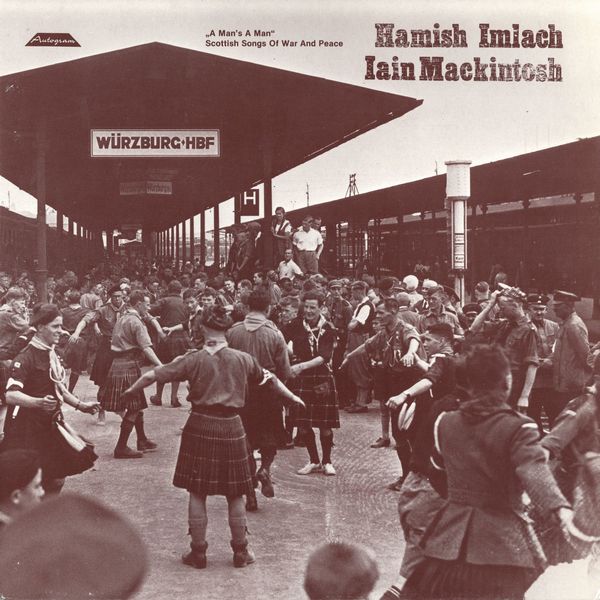 |
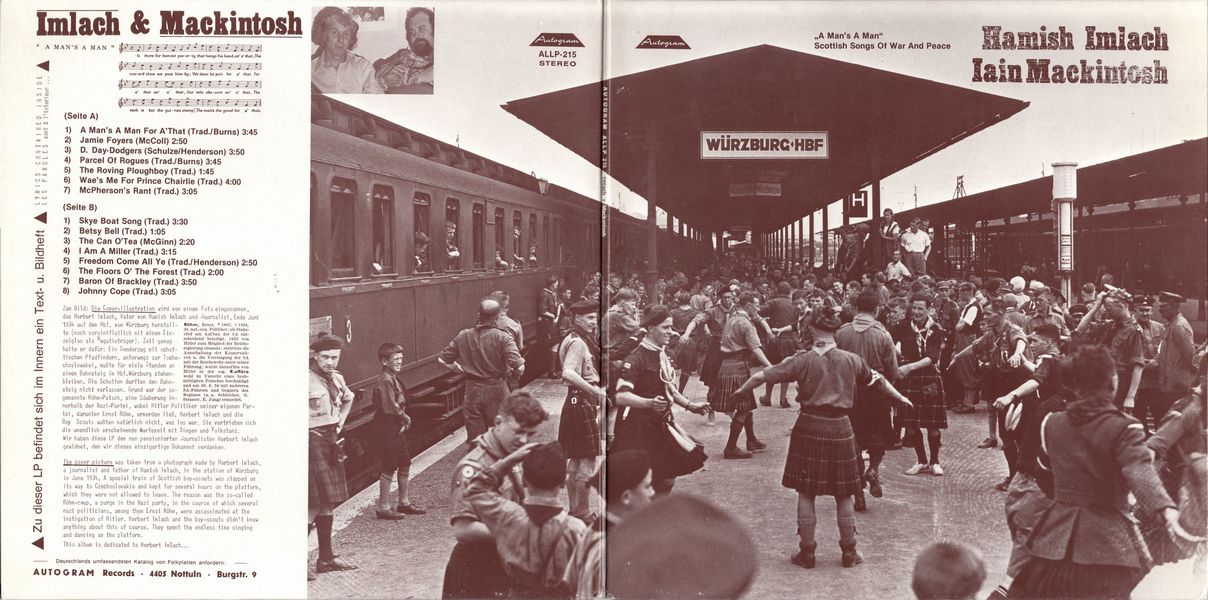
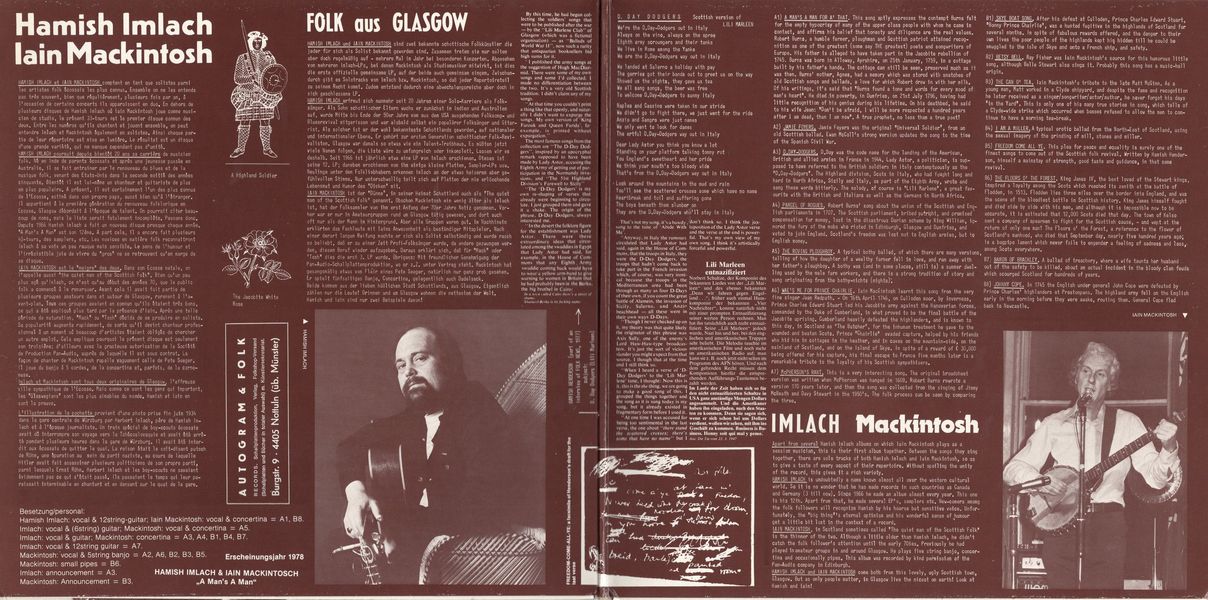 |
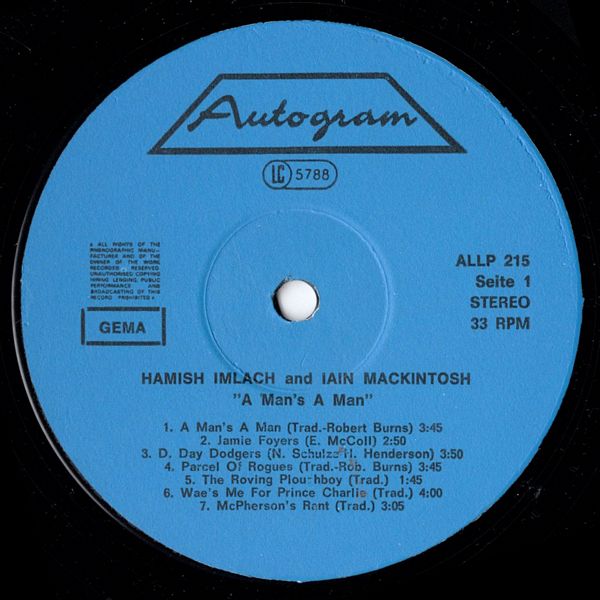
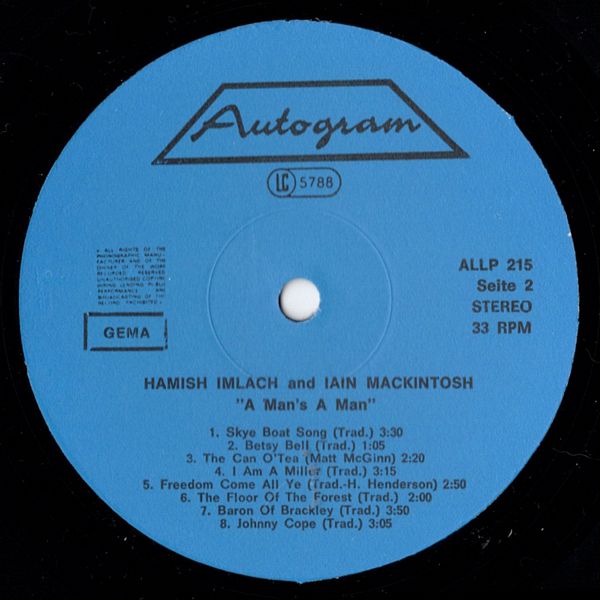 |
The cover picture was taken from a photograph made by Herbert Imlach, a journalist and father of Hamish Imlach, in the station of Würzburg in June 1934. A special train of Scottish boy-scouts was stopped on its way to Czechoslovakia and kept for several hours on the platform, which they were not allowed to leave. The reason was the so-called Röhm-coup, a purge in the Nazi party, in the course of which several nazi politicians, among them Ernst Röhm, were assassinated at the instigation of Hitler. Herbert Imlach and the boy-scouts didn't know anything about this of course. They spent the endless time singing and dancing on the platform.
This album is dedicated to Herbert Imlach …
Sleeve Notes
Apart from several Hamish Imlach albums on which Iain Mackintosh plays as a session musician, this is their first album together. Between the songs they sing together, there are solo tracks of both Hamish Imlach and Iain Mackintosh, so as to give a taste of every aspect of their repertoire. Without spoiling the unity of the record, this gives it a rich variety.
HAMISH IMLACH is undoubtedly a name known almost all over the western cultural world. So it is no wonder that he has made records in such countries as Canada and Germany (3 till now). Since 1966 he made an album almost every year. This one is his 12th. Apart from that, he made several EP's, samplers etc. New-comers among the folk followers will recognize Hamish by his hoarse but sensitive voice. Unfortunately, the "big thing"'s eternal optimism and his wonderful sense of humour get a little bit lost in the context of a record.
IAIN MACKINTOSH, in Scotland sometimes called "The quiet man of the Scottish Folk" is the thinner of the two. Although a little older than Hamish Imlach, he didn't catch the folk follower's attention until the early 70's. Previously he had played in amateur groups in and around Glasgow. He plays five string banjo, concertina and occasionally pipes. This album was recorded by kind permission of the Pan-Audio company in Edinburgh.
HAMISH IMLACH and IAIN MACKINTOSH come both from this lovely, ugly Scottish town, Glasgow. But as only people matter, in Glasgow live the nicest on earth! Look at Hamish and Iain!
By this time, he had begun collecting the soldiers' songs that were to be published after the war — by the "Lili Marlene Club" of Glasgow (which was a fictional organisation) — as "Ballads of World War II", now such a rarity that antiquarian booksellers bid high sums for it.
I published the army songs at the suggestion of Hugh MacDiarmid. There were some of my own songs and some I'd collected, I made no differentiation between the two. It's a very old Scottish tradition. I didn't claim any of my songs.
At that time you couldn't print a thing like that openly, and naturally I didn't want to expurge the songs. My own version of 'King Farouk and Queen Farida', for example, is printed without expurgation.
The most famous songs from the collection are "The D-Day Dodgers", inspired by an apocryphal remark supposed to have been made by Lady Astor, accusing the Eighth Army of getting out of participation in the Normandy Invasions, and "The 51st Highland Division's Farewell to Sicily.
"The D-Day Dodgers" is my own re-shaping of verses that already were beginning to circulate. I just grouped them and gave it a shake. The origin of the phrase. D-Day Dodgers, always interested me.
In the desert the folklore figure for the establishment was Lady Astor. There were these extraordinary ideas that circulated among the swaddies in Egypt that Lady Astor had said, lot example, in the House of Commons that any Eighth Army swaddle coming back would have to wear a yellow armband to give warning to women in Britain that he had probably been in the Berka, the big brothel in Cairo:
In a town called Cariro there's a street of shame,
Sharia-el-Berka is its fucking name.
That's not my song, it's a bawdy song to the tune of 'Abide With Me'.
Anyway, in Italy the rumours circulated that Lady Astor had said, again in the House of Commons, that the troops in Italy, they were the D-Day Dodgers, the troops that hadn't come back to take part in the French invasion which, of course, was very ironical because the troops in the Mediterranean area had been through as many as four D-Days of their own, if you count the great battle of Alamein, the invasion of Sicily. Salerno, and Anzio beachhead — all these were in their own ways D-Days.
Though I never checked upon it, my theory was that quite likely the originator of this phrase was Axis Sally, one of the enemy's Lord Haw-Haw-type broadcasters. It's just the sort of vicious slander you might expect from that source. I though that at the time and I still think so.
When I heard a verse of 'D-Day Dodgers' to the 'Lili Marlene' tune, I thought: Now this is It, this is the the thing, we are going to make a good song of this. I grouped the things together and the song as it is sung today is my song, but it already existed in fragmentary form before I used it.
At one time I was accused for being too sentimental in the last verse, the one about "there stand the scattered crosses; there's some that have no name" but I don't think so. I think the juxtaposition of the Lady Astor verse and the verse at the end is powerful. That's my own view of my own song, I think it's artistically forceful and powerful.
Hamish Henderson
(Part of an interview of Folk News, 1977)
Subject: D.Day Dodgers (Lili Marleen)
D.D A Y DODGERS
Scottish version of LILI MARLEEN
We're the D.Day-Dodgers out in Italy
Always on the vino, always on the spree
Eighth army scroungers and their tanks
We live in Rome among the Yanks
We are the D.Day-Dodgers way out in Italy
We landed at Salerno a holiday with pay
The gerries got their bands out to greet us on the way
Showed us the sights, they gave us tea
We all sang songs, the beer was free
To welcome D.Day-Dodgers to sunny Italy
Naples and Cassino were taken in our stride
We didn't go to fight there, we just went for the ride
Anzio and Sangro were just names
We only went to look for dames
The artful D.Day-Dodgers way out in Italy
Dear Lady Astor you think you know a lot
Standing on your platform talking tommy rot
You England's sweetheart and her pride
We think your mouth's too bloody wide
That's from the D.Day-Dodgers way out in Italy
Look around the mountains in the mud and rain
You'll see the scattered crosses some which have no name
Heartbreak and toil and suffering gone
The boys beneath them slumber on
They are the D.Day-Dodgers who'll stay in Italy
A MAN'S A MAN FOR A' THAT — This song aptly expresses the contempt Burns felt for the empty hypocrisy of many of the upper class people with whom he came in contact, and affirms his belief that honesty and diligence are the real values, Robert Burns, a humble farmer, ploughman and Scottish patriot attained recognition as one of the greatest (some say THE greatest) poets and songwriters of Europe. His father is alleged to have taken part in the Jacobite rebellion of 1745. Burns was born in Alloway, Ayrshire, on 25th January, 1759, in a cottage built by his father's hands. The cottage can still be seen, preserved much as it was then. Burns' mother, Agnes, had a memory which was stored with snatches of old Scottish songs and ballads, a love for which Robert drew in with her milk.
Of his writings, it's said that "Burns found a tone and words for every mood of man's heart". He died in poverty, in Dumfries, on 21st July 1796, having had little recognition of his genius during his lifetime. On his deathbed, he said to his wife Jean: "Don't be afraid, I will be more respected a hundred years after I am dead, than I am now". A true prophet, no less than a true poet!
JAMIE FOYERS — Jamie Foyers was the original "Universal Soldier", from an old Scottish ballad. Ewan McColl's strong version updates the song to the time of the Spanish Civil War.
D.DAY-DODGERS — D.Day was the code name for the landing of the American, British, and allied armies in France in 1944. Lady Astor, a politician, is supposed to have referred to the British soldiers in Italy contemptuously as the "D.Day-Dodgers". The Highland division, Scots in Italy, who had fought long and hard in North Africa, Sicily and Italy, as part of the Eighth Army, wrote and sang these words bitterly. The melody, of course is "Lili Marlene", a great favourite with the British and Italians as well as the Germans in North Africa.
PARCEL OF ROGUES — Robert Burns' song about the union of the Scottish and English parliaments in 1707. The Scottish parliament, bribed outright, and promised compensation for money, lost in the disastrous Darian scheme by King William, ignored the fury of the mobs who rioted in Edinburgh, Glasgow and Dumfries, and voted to join England. Scotland's freedom was lost not to English armies, but to English money.
THE ROVING PLOUGHBOY — A typical bothy ballad, of which there are many versions, telling of how the daughter of a wealthy farmer fell in love, and ran away with her father's ploughboy. A bothy was (and in some places, still is) a summer dwelling used by the male farm workers, and there is a strong tradition of story and song originating from the bothy-nichts (nights)'.
WAE'S ME FOR PRINCE CHAIRLIE — Iain Mackintosh learnt this song from the very fine singer Jean Redpath. - On 16th. April-1746, on Culloden moor, by Inverness, Prince Charles Edward Stuart led his Jacobite army against the Hanoverian forces, commanded by the Duke of Cumberland, in what proved to be the final battle of the Jacobite uprising. Cumberland heavily defeated the highlanders, and is known to this day, in Scotland as "The Butcher", for the inhuman treatment he gave to the wounded and beaten Scots. Prince "Chairlie" evaded capture, helped by his friends who hid him in cottages in the heather, and in caves on the mountain-side, on the mainland of Scotland, and on the Island of Skye. In spite of a reward of £ 30,000 being offered for his capture, his final escape to France five, months later is a remarkable tribute to the loyalty of his Scottish sympathisers.
McPHERSON'S RANT — This is a very interesting song. The original broadsheet version was written when McPherson was hanged in 1609. Robert Burns rewrote a version 170 years later, and then the song was collected from the singing of Jimmy McBeath and Davy Stewart in the 1950's. The folk process can be seen by comparing the three.
SKYE BOAT SONG — After his defeat at Culloden, Prince Charles Edward Stuart, "Bonny Prince Chairlie", was a hunted fugitive in the highlands of Scotland for several months. In spite of fabulous rewards offered, and the danger to their own lives the poor people of the highlands kept him hidden till he could be smuggled to the Isle of Skye and onto a French ship, and safety.
BETSY BELL — Ray Fisher was Iain Mackintosh's source for this humorous little song, although Belle Stewart also sings it. Probably this song has a music-hall origin.
THE CAN O' TEA — Iain Mackintosh's tribute to the late Matt McGinn. As a young man, Matt worked in a Clyde shipyard, and despite the fame and recognition he later received as a singer/songwriter/actor/author, he never forgot his days "in the Yard". This is only one of his many true stories in song, which tells of a Clyde-wide strike which occurred when bosses refused to allow the men to continue to have a morning tea-break.
I AM A MILLER — A typical erotic ballad from the North-East of Scotland, using the sexual imagery of the grinding of mill, stones and miller.
FREEDOM COME ALL YE — This plea for peace and equality is surely one of the finest songs to come out of the Scottish folk revival. Written by Hamish Henderson, himself a mainstay of strength, good taste and guidance, in that same revival.
THE FLOORS O' THE FOREST — King James IV, the best loved of the Stewart kings, inspired a loyalty among the Scots which reached its zenith at the battle of Flodden, in 1513. Flodden lies three miles over the border into England, and was the scene of the bloodiest battle in Scottish history. King James himself fought and died side by side with his men, and although it is impossible now to be accurate, it is estimated that 12,000 Scots died that day. The town of Kelso sent a company of spearmen to fight for the Scottish cause, - and wept at the return of only one man! The Floors o' the Forest, a reference to the flower of Scotland's manhood, who died that September day, nearly five hundred years ago, is a bagpipe lament which never fails to engender a feeling of sadness and loss, among Scots everywhere.
BARON OF BRACKLEY — A ballad of treachery, where a wife taunts her husband out of the safety to be killed, about an actual incident in the bloody clan feuds which scourged Scotland for hundreds of years.
JOHNNY COPE — In 1745 the English under general John Cope were defeated by Prince Charles' highlanders at Prestonpans. The highland army fell on the English early in the morning before they were awake, routing them. General Cope fled back to Newcastle.
Iain Mackintosh